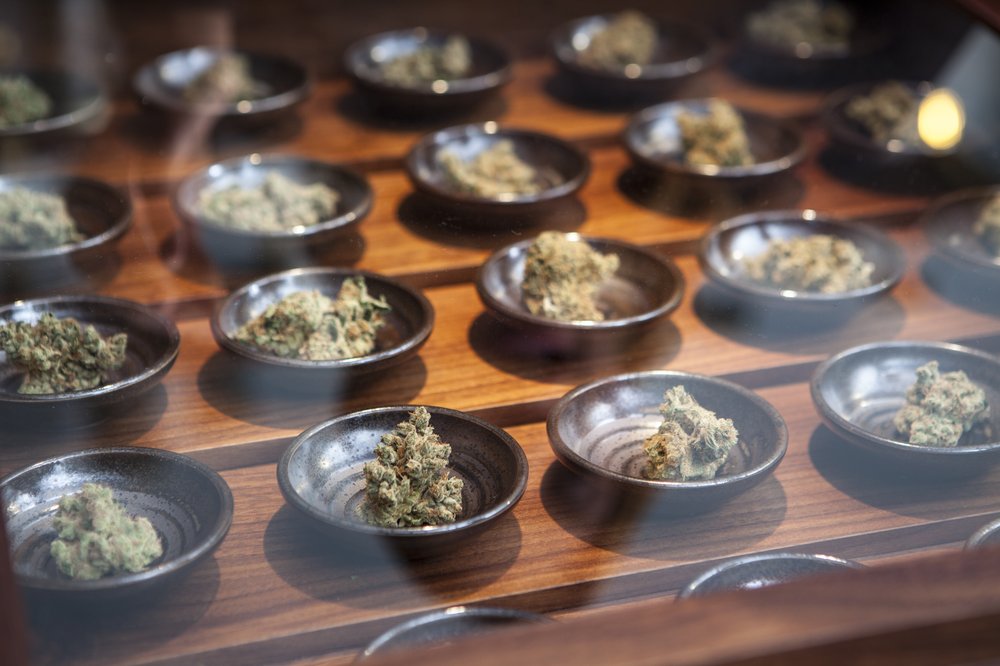More New York marijuana dispensaries should be able to open after settlement with veterans
Nov. 27, 2023, 4:19 p.m.
A judge must still sign off on settlements with groups objecting to the license program that prioritized people with past marijuana convictions and their families.

State officials say after weeks of uncertainty, hundreds of New York cannabis entrepreneurs will likely soon be able to move forward with plans to open dispensaries across the state.
New York’s Cannabis Control Board voted Monday to accept a settlement in two lawsuits challenging the legality of the licensing program that launched the state’s recreational cannabis industry. One of those lawsuits resulted in an injunction against the program in August, forcing the slow legal roll-out to screech to a halt.
The case that led to the injunction was brought by four service-disabled veterans who objected to the state’s Conditional Adult Use Retail Dispensary program, a social equity initiative that reserved the state’s first licenses for people with past marijuana convictions and their family members. The plaintiffs argued that, under New York’s Marijuana Regulation and Taxation Act, other groups, including veterans, should also have been prioritized.
The state is also settling with a group of large cannabis companies that already have medical licenses in the state and are waiting on their chance to enter the recreational market. A coalition of those companies filed a lawsuit in March calling the conditional license program unconstitutional, arguing state policymakers overstepped their authority when they created it.
The state has not released the details of the settlement, which needs to be approved in court before the injunction can be lifted. Spokespeople for the plaintiffs in the lawsuits did not immediately respond to a request for comment.
When the injunction was issued in August, the state had given out 463 conditional dispensary licenses, but only a handful of shops had actually opened. Some license holders said they had already invested hundreds of thousands of dollars, or in some cases upward of $1 million, in securing real estate and building out their shops when the program was put on hold. Many sought exemptions to the injunction, but only five were approved by a judge.
Earlier this month, the Cannabis Control Board put a settlement vote on its agenda, but removed it at the last minute.
“I share in the frustration that I know many of you feel,” Chris Alexander, executive director of the state Office of Cannabis Management, said in a statement last week on the delay in reaching an agreement.
But Alexander said his office remained committed to the conditional license program.
Meanwhile, the first-mover advantage that licensees were promised under the program has started to slip away. The state opened up cannabis business applications to the general public in early October and will continue accepting applications through mid-December.
Some conditional licensees are still in the process of trying to get their proposed retail locations approved by the state, and will soon be competing with general license applicants for limited space, since dispensaries must be located at least 1,000 feet away from each other.
Conditional license holder Jennifer Tzar said she was eager to open her SoHo shop, Dagmar Cannabis. She said her store passed its final state inspection about a month ago and she’s since been waiting on a resolution to the lawsuit to be able to open. In that time, she said, she’s spent about $75,000 on expenses such as rent and keeping employees on payroll.
She said the delay in opening required her to raise additional funds from investors.
Tzar said she was not surprised that New York’s rollout was mired in lawsuits, since other states have also faced legal challenges to social equity licensing programs.
“I already knew looking at other states that getting into this business was not for the faint of heart and that it was going to be difficult no matter what,” she said.
But she said she continues to worry about competition from illegal, unlicensed dispensaries, which have flourished in New York City as the legal industry has faced setbacks.
State and local officials continue to experiment with different approaches to stopping illegal sales, and enforcement agents with the state Office of Cannabis Management admitted earlier this month that it has been a slow process.
The city sheriff’s office has sent out letters to the landlords of 50 buildings where people are suspected of illegally selling cannabis or tobacco products, alerting them that they could be liable for illicit sales on the premises, Mayor Eric Adams’ office said Monday.
The letters notified these building owners that they could be fined for violating a city nuisance law, in addition to other penalties. The city has already issued $3.2 million in civil penalties to proprietors at these 50 locations and seized about $3.9 million in merchandise, according to the mayor.
Adams first announced the strategy of going after landlords in February, as part of a collaboration with the Manhattan district attorney’s office.
Magnolia Bakery has weed edibles now. But you can’t buy them in New York. Astoria's first cannabis dispensary opens after monthslong legal haze $12M in 6 months: How New York’s first legal weed retailer exceeded expectations